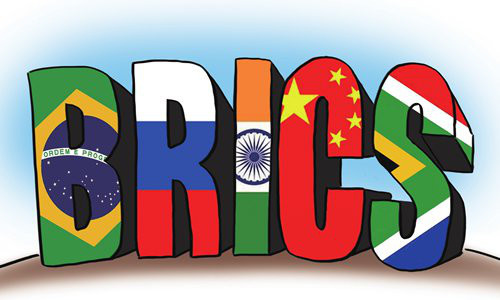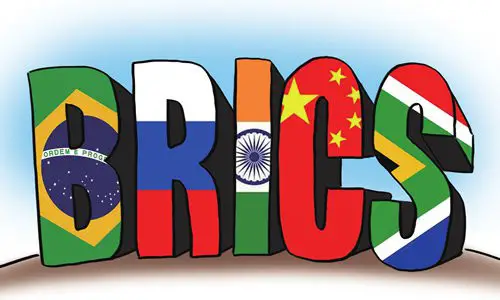By Liu Zongyi Source: People’s Daily and Global Times

With the complete withdrawal of the Indian military from the Doklam region on Monday, a 71-day border standoff was brought to an end and effectively ushered in a more favorable political atmosphere for the 9th BRICS summit in Xiamen on September 3-5. By exercising restraint and seeking peaceful solution, China has played an exemplary role in safeguarding the unity of the BRICS nations and the ultimate goal of cooperation between developing countries, and demonstrated a sense of responsibility as a major global power. The BRICS summit will convene as scheduled.
This summit marks the beginning of another decade for the BRICS mechanism. It was initially established to help member states face common issues relating to development, overcome similar disadvantaged positions in international economic and political systems formed by Western countries, and help member states gradually reform these systems and play a greater role in global governance.
To make greater contribution to global governance is not only the shared wish of emerging economies represented by BRICS, but is also an urgent requirement of the international community including Western countries who have been experimenting with new dialogue arrangements such as Heiligendamm process.
BRICS has achieved a great deal over the past 10 years, not least through the establishment of its three key pillars of economic cooperation, political and security cooperation, and people-to-people exchanges.
The 2015 Ufa summit proposed to build a "BRICS partnership for world peace, common development, inter-civilization dialogue and more effective global economic governance." BRICS members reached agreements through economic partnerships and made achievements in economic, trade, investment and technological cooperation, turning BRICS from a "conceptual" pact into a "practical" one.
At the same time, the BRICS has also led to progress in mechanism building, and the establishment of the BRICS New Development Bank (NDB) and a reserve currency pool has seen it extend its global influence.
The NDB held its second annual meeting this year, launched its first batch of investment projects across BRICS states and opened its Africa office in South Africa this year. Thanks to its unity and cooperation, BRICS countries have gained a bigger say in the IMF and the World Bank during a period of international financial reform.
This said, it is clear that BRICS still has a long way to go. A forum for emerging powers, it remains more of a symbol than a mechanism with actual functions.
Although BRICS has not been "eclipsed" as some Western media claim, it has not taken major steps forward in terms of promoting cooperation within its member states or reforming global economic governance. Some member states even used hosting the summit as a platform to isolate or defame its neighbors, and endorse strengthening ambitions of hegemony in the region.
One key reason BRICS remains underdeveloped after 10 years in existence is that it has failed to motivate and unify other emerging economies and developing countries, and no "scale effect" has come into play.
To other emerging economies and developing countries, BRICS - a "clique" derived from the concept of an investment bank - does not represent their interests or their voice, and it is unlikely that they would benefit from the development of the mechanism.
Furthermore, members of this "clique" are quite obviously different, and economic cooperation between some members is rather limited. Agreements sealed by BRICS can be difficult to implement and may never materialize. Certain member states of two minds often look to play the role of a "swing state" in the international system and often side with Western countries on certain global and regional issues, which badly undermines BRICS as an entity and its voice as a whole.
Besides, although BRICS countries want to have common development, they have not found what can promote this mission.
The 2017 summit is themed "BRICS: Stronger Partnership for a Brighter Future." Chinese President Xi Jinping hopes it will reach four key objectives, namely deepening pragmatic cooperation for common development; enhancing global governance to jointly counter challenges; carrying out people-to-people exchanges to consolidate public support for cooperation, and promoting mechanism building to construct broader partnership. "Development" and "cooperation" stand out as key words for this summit.
Meanwhile, the summit has another important task - to further expand partnerships via the new "BRICS+" mechanism so that BRICS will truly become the voice of emerging economies and developing countries, and a champion of South-South cooperation.
As well as tackling exposed shortfalls in the BRICS group, the key focus of the summit under a Chinese proposal aims to promote a new kind of globalization more favorable to emerging economies and developing countries.
Set against the backdrop of a prevalent trend toward "anti-globalization" and the rise of trade protectionism in the West, the Belt and Road initiative and the community of shared destiny will help its member states attain this goal. The Belt and Road initiative is the very incarnation of the BRICS spirit of openness, inclusiveness, cooperation and win-win, and will continue to lay down solid foundations for the path forward for BRICS over the next decade.
The author is a senior fellow of Shanghai Institutes for International Studies and a visiting fellow of the Chongyang Institute for Financial Studies, Renmin University of China.
This summit marks the beginning of another decade for the BRICS mechanism. It was initially established to help member states face common issues relating to development, overcome similar disadvantaged positions in international economic and political systems formed by Western countries, and help member states gradually reform these systems and play a greater role in global governance.
To make greater contribution to global governance is not only the shared wish of emerging economies represented by BRICS, but is also an urgent requirement of the international community including Western countries who have been experimenting with new dialogue arrangements such as Heiligendamm process.
BRICS has achieved a great deal over the past 10 years, not least through the establishment of its three key pillars of economic cooperation, political and security cooperation, and people-to-people exchanges.
The 2015 Ufa summit proposed to build a "BRICS partnership for world peace, common development, inter-civilization dialogue and more effective global economic governance." BRICS members reached agreements through economic partnerships and made achievements in economic, trade, investment and technological cooperation, turning BRICS from a "conceptual" pact into a "practical" one.
At the same time, the BRICS has also led to progress in mechanism building, and the establishment of the BRICS New Development Bank (NDB) and a reserve currency pool has seen it extend its global influence.
The NDB held its second annual meeting this year, launched its first batch of investment projects across BRICS states and opened its Africa office in South Africa this year. Thanks to its unity and cooperation, BRICS countries have gained a bigger say in the IMF and the World Bank during a period of international financial reform.
This said, it is clear that BRICS still has a long way to go. A forum for emerging powers, it remains more of a symbol than a mechanism with actual functions.
Although BRICS has not been "eclipsed" as some Western media claim, it has not taken major steps forward in terms of promoting cooperation within its member states or reforming global economic governance. Some member states even used hosting the summit as a platform to isolate or defame its neighbors, and endorse strengthening ambitions of hegemony in the region.
One key reason BRICS remains underdeveloped after 10 years in existence is that it has failed to motivate and unify other emerging economies and developing countries, and no "scale effect" has come into play.
To other emerging economies and developing countries, BRICS - a "clique" derived from the concept of an investment bank - does not represent their interests or their voice, and it is unlikely that they would benefit from the development of the mechanism.
Furthermore, members of this "clique" are quite obviously different, and economic cooperation between some members is rather limited. Agreements sealed by BRICS can be difficult to implement and may never materialize. Certain member states of two minds often look to play the role of a "swing state" in the international system and often side with Western countries on certain global and regional issues, which badly undermines BRICS as an entity and its voice as a whole.
Besides, although BRICS countries want to have common development, they have not found what can promote this mission.
The 2017 summit is themed "BRICS: Stronger Partnership for a Brighter Future." Chinese President Xi Jinping hopes it will reach four key objectives, namely deepening pragmatic cooperation for common development; enhancing global governance to jointly counter challenges; carrying out people-to-people exchanges to consolidate public support for cooperation, and promoting mechanism building to construct broader partnership. "Development" and "cooperation" stand out as key words for this summit.
Meanwhile, the summit has another important task - to further expand partnerships via the new "BRICS+" mechanism so that BRICS will truly become the voice of emerging economies and developing countries, and a champion of South-South cooperation.
As well as tackling exposed shortfalls in the BRICS group, the key focus of the summit under a Chinese proposal aims to promote a new kind of globalization more favorable to emerging economies and developing countries.
Set against the backdrop of a prevalent trend toward "anti-globalization" and the rise of trade protectionism in the West, the Belt and Road initiative and the community of shared destiny will help its member states attain this goal. The Belt and Road initiative is the very incarnation of the BRICS spirit of openness, inclusiveness, cooperation and win-win, and will continue to lay down solid foundations for the path forward for BRICS over the next decade.
The author is a senior fellow of Shanghai Institutes for International Studies and a visiting fellow of the Chongyang Institute for Financial Studies, Renmin University of China.
 Menu
Menu
 BRICS summit forges path for new decade
BRICS summit forges path for new decade
















